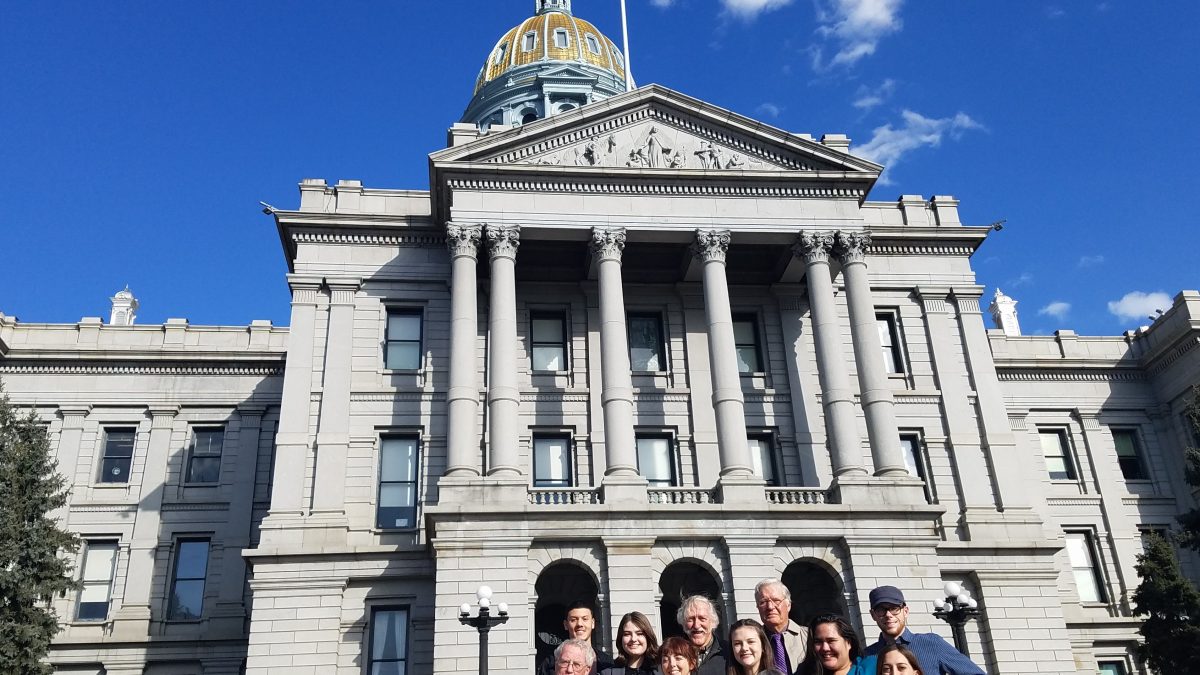- An Alliance For Community Action
- (970) 256-7650
- info@WesternColoradoAlliance.org
Mid-term elections lend drama to legislative session
And that’s a wrap for the 2018 Legislative session in Colorado! Filled with drama and unexpected turns, 2018 has been a year at the Capitol not just to watch, but to participate in. Following the success of this year’s People’s Lobby Trip (see adjacent article), where our members helped persuade a Western Slope legislator to change his vote in committee, WCC members have continued to have a vocal presence at the Capitol through phone calls, emails and remote testimony.
Midterm election years at the Colorado legislature can be notorious for few meaningful bills being passed. For our legislators, their votes can be a deciding factor in their bid for re-election come November. For this reason, they run strong messaging bills to make a statement, knowing they aren’t likely to succeed. With split chambers at the Capitol, this situation results in bills being born out of dreams and nightmares.
Bills that packed that kind of political punch included:
- a requirement to transition to 100% renewable energy by 2035;
- a requirement of local governments to pay damages to mineral interest owners if a fracking ban is implemented;
- the creation of a class 4 felony for state or local elected officials who create, enforce or implement sanctuary policies; and
- the creation of a purple card which would allow undocumented individuals to work legally in the state of Colorado.
Rural Economics a Top Priority
Governor Hickenlooper is not running for re-election this year. So, when he announced during his final State of the State address that among his top priorities was support for rural economies, he meant it — and the State Legislature responded. Our Western Slope legislators sponsored and passed financing for rural broadband by re-allocating money from a largely unused fund. Following that lead, a bill passed that will allow secondary providers the ability to install rural broadband if that location’s primary provider fails to install it. Additionally, we helped pass a bill to allow electric consumers the right to install, interconnect, and use energy storage systems on their property, allowing Colorado residents the ability to save money.
Yet even in bills WCC supported, including renewable energy, alternative fuel vehicles, and rural broadband, the devil was in the details. With compromises and amendments made in both the House and the Senate, we dug into the bills, testified in committees, met with our legislators, and watched them closely as they evolved, moving through the chambers.
While bills that have been political hot spots in the past have unexpectedly sailed through, other seemingly safe bills have been held hostage in partisan battles. A bill to create a taskforce to address youth experiencing homelessness died in committee along party lines. A House bill to extend the Colorado Civil Rights Commission was sent to Conference Committee following disagreements between the House and the Senate. Teetering between life and death, the bill passed in the final hours, giving the Commission an additional 9 years of life.
Some things remained status quo this year as bills introduced to implement common sense oil and gas regulations headed to the Senate to die, while a bill to remove tax incentives to purchase innovative vehicles made it through the Senate, only to die in the House. The Senate disliked a House bill to reduce greenhouse gas emissions so much it was assigned it to multiple committees, just to see it die three times.
And the battle continued with the latest iteration of school setbacks, a bill which would require oil and gas facilities and wells be located a minimum of 1,000 feet from school property lines. As expected, it died in the Senate’s kill Committee, but is guaranteed to be back again.
Sexual Harrassment at the State Capitol
Another dominant topic of discussion had nothing to do with legislation, but with the environment in the Capitol. Both the House and the Senate were rocked with sexual harassment allegations raised against sitting legislators. Following several investigations, the House chose to oust Democrat Steve Lebsock, but not before he switched party affiliation, leaving his vacant seat to the Republicans. Unlike the House, a resolution to remove Senator Randy Baumgardner from the Senate failed, and Senate leadership stripped Baumgardner of his committee assignments and leadership positions just a few days before the end of session.
Setting the stage for this year’s midterm elections, the legislative session forecasts an interesting shake-up come November.
Now that session is out, the work doesn’t end for our Legislative Committee here at Western Colorado Alliance. We’ll meet face to face in June to debrief and discuss the year ahead, as well as meet in-district with our Western Slope legislators. To get involved and find out more about what you can do, contact community organizer Jeriel Clark at jeriel@westerncoloradoalliance.org.
Jeriel joined the Western Colorado Alliance staff in February 2017 (back when we were still Western Colorado Congress), but you may remember her as our Canvass Director for the successful Minimum Wage ballot initiative in 2016! In her young career, Jeriel has worked with engaged citizens across Colorado on issues ranging from veterans' affairs, healthcare and women’s rights. Jeriel has called Grand Junction and the Western Slope home for 16 years, and enjoys running, hiking, biking and crafting with her daughter Emma.


